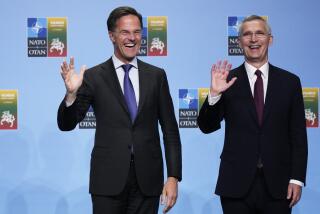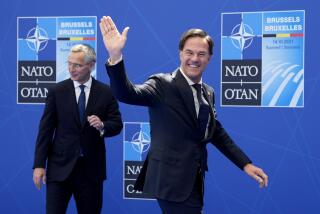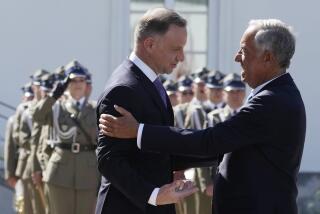Belgium Stance a Crucial Issue in Arms Talks
- Share via
WASHINGTON — Belgium’s indecision about accepting new NATO nuclear missiles presents a “dicey” domestic political problem for Prime Minister Wilfried Martens, but President Reagan still intends to press for “Alliance cohesion” during their talks on Monday, a senior U.S. official said Friday.
The Administration believes the Soviets agreed to return to arms talks because of the firmness shown by the Allies in proceeding with the deployment of the new U.S.-built missiles, and a Belgium deferral now would have a “counterproductive effect,” the official said.
He spoke to reporters under rules forbidding use of his name.
Meeting Arranged During talks and a working lunch on Monday, Reagan and Martens will discuss plans by the North Atlantic Treaty Organization to move forward with the deployment of the 572 U.S.-built Pershing 2 and cruise missiles in Belgium and four other Allied nations in Western Europe.
The prime minister also will meet with Secretary of State George P. Shultz and Defense Secretary Caspar W. Weinberger later in the day.
Belgium backed NATO’s 1979 decision to deploy the missiles as a response to the Soviet basing of SS-20 missiles--now said to number 396--that are aimed at Western Europe. But Martens and his council of ministers face a decision by March on giving a final green light for basing the first of the missiles.
So the Reagan-Martens session comes at a crucial time. The prime minister’s own party--the largest in a complex coalition government--has asked for a delay to await the results of the renewed arms talks. Martens faces elections this year and some elements of the party have urged him to delay the decision until they are over.
“The President will be telling the prime minister that we hope and expect Belgium will live up to its part in the 1979 Alliance decision,” the U.S. official said. He said Reagan will point out that the United States expects Belgium “will maintain Alliance cohesion . . . and begin the deployment in March.”
The United States recognizes that Martens and members of his party must go through “a lot of soul searching” because elements of his coalition government could desert him over the issue and bring the government down, the official said.
“It is a dicey situation,” he added.
Therefore, the official said, Reagan will stress the importance of the decision and point out that several other Western European leaders have had to face the same decision, have gone ahead with the deployment and have survived elections.
Another aspect of the Belgian decision that concerns the Americans is the “considerable impact” a possible deferral might have on the Netherlands, which has also expressed reservations over the missiles, the briefer said.
“It could have an erosive effect if Belgium opted out and that could tend to undercut the deployment in other countries,” he said.
The official said some trade disputes will be brought up in the talks, but he did not expect any “quid pro quos” to be offered in that area in return for cooperation on the arms front.
He said Administration officials understand that Martens may be putting his political life on the line, and they intend to point out that there are several areas involving trade matters “in which we can say we will be sympathetic in the future.”
The United States objected when Libya proposed buying some nuclear equipment from a Belgian firm, and the Belgians have not made a decision on the matter, the official said.
More to Read
Sign up for Essential California
The most important California stories and recommendations in your inbox every morning.
You may occasionally receive promotional content from the Los Angeles Times.











